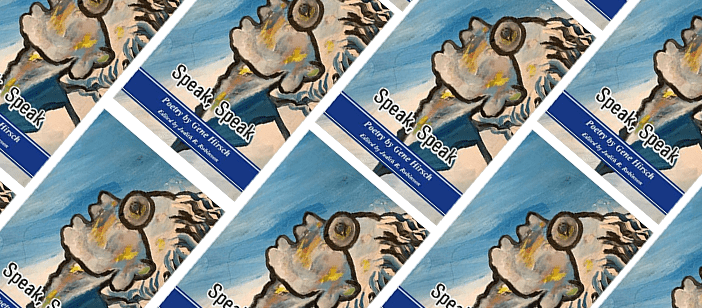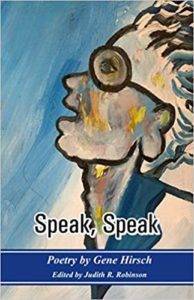From the Editor: “Dr. Eugene Hirsch, Gene, to all who know him, has extended to me (Judith R. Robinson) the privilege of editing his poetry, an assignment I accepted with pleasure. This collection, Speak, Speak, is the culmination of Gene’s long career of writing, and reflects the complexity of his mind and experience. As a physician/writer he joins a distinguished list, and in my opinion as a reader/editor, he earns his place among the others, notably Maugham, Chekhov, William Carlos Williams.”
About the Author: Gene Hirsch is an academic geriatrician who, for many years, has taught human values and the emotional care of sick and dying people to medical students and doctors. He has conducted poetry workshops widely for health professionals as an expressive adjunct to their caring experiences, as well as for poets in Western North Carolina. He initiated a writing program at the John C. Campbell Folk School and has taught there for 22 years. His poetry has appeared in medical and non-medical journals such as Pharos (Medical Honor Society), Hiram Poetry Review, Journal of Medical Humanities, Fetishes (Univ. of Colorado), and The Journal of the American Medical Society. He has written two books, Down the Rutty Pot-hole Road and You Shall Die Again No More. Anthology appearances include The Brentwood Anthology, Echoes across the Blue Ridge, Tyranny of the Normal, Crossing Limits: African Americans and American Jews. He has produced five volumes of Freeing Jonah, Poetry from Western North Carolina. His poem “Maria Sabina” (reprinted below) won first prize in the Westmoreland Poetry Contest in 2019.
About the Editor: Judith R. Robinson is an editor, teacher, fiction writer, poet and visual artist. A 1980 summa cum laude graduate of the University of Pittsburgh, she is listed in the Directory of American Poets and Writers. She has published more than 75 poems; five poetry collections; one fiction collection; one novel; and edited or co-edited eleven poetry collections. She teaches for Osher Lifelong Learning Center at both Carnegie Mellon University and the University of Pittsburgh.
Monsieur Mime
His lacquered face___
laughing eyes with milky guile.
They droop, sag purple
into the whisper-kissed
For the sweet love of God,
entombed in his throat.
He swallows, gags,
chokes back his tears,
gropes through echoing halls,
one drama to the next,
in our taunting
Theaters of the Absurd.
Tumbling through my mind,
his lips swell tight.
His pain spoils the cream
that spills on my Daily Bisque,
taupe, chocolate brown—
that saturates my brain,
strangles my laughter
in labyrinths of fizzzz.
Left Behind
Burning
in the afternoon squall,
waves of gray geese
filled the distance,
seared by the sun,
driven down
against the wills
of their disfigured wings.
Their severed parts of speech
skewed the simplest verses
in the world,
straining to pronounce them
as if they were sweet.
If these verses were sweet,
I‘d tell you
that their thrumming pain
burns less the more they bend.
But Time spirals inward.
Textures lose their waves,
collapse to shreds, to discord.
If they were pleasant,
I would laugh and say to you,
These flights are pleasant.
These geese are kind.
Their waves are fine.
Their verses, charming,
as I’ve been left behind
to float alone
where my planet used to be.
Parallax
If no sun exists
outside the space of time,
there can be no infinite beyond,
only the span of a life and its death.
So I ask you,
do suns devour their skins?
Is sleep nude?
Between linen sheets of drizzle?
Do they hide from their own elegance?
Since our moon streams light
from the sun obliquely
beyond the face of our planet,
how can it be truly be called full at all?
Of course. Light bends, distorting itself
to satisfy the shape of the universe.
But at the end of day,
why does the moon not glow scarlet,
iridescent, like the sun
and the thin cirrus strands
that blanket the skyline,
crossed here and there
by jet streams flying
from the ends of the Earth?
When will the sun burn out
and the moon grow dark forever?
Maria Sabina
When Maria Sabina died,
someone twisted the neck
of a rooster and laid it
by her side. On the fourth
day, not the third or the fifth,
its spirit rose up and crowed,
calling her soul to depart,
to start its journey
to the Dead Land
feeding on squash seeds,
greens and fruit along the way.
Someone lit a candle at her feet.
And on the fifth, not the fourth day
or the sixth, her soul rose
and folded a palm cross
through cow fields and cold streams.
She was neither thirsty nor hungry.
in her right hand
as it lay on her breast.
She followed the rooster,
dressed not in feathers
on the wings of a songbird,
but naked, without shoes,
On that day, in a single moment
of the moon, she felt fresh.
after The Mythology of Mexico and Central America.
John Bierhorst. New York, William Morrow.
This excerpt from Speak, Speak by Gene Hirsch is published here courtesy of the author and should not be reproduced without permission.


























